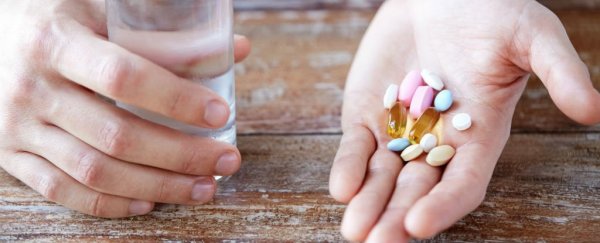It seems like simple, obvious advice: Eat your vegetables, get some exercise, and, of course, take your vitamins.
Or not.
Decades of research, including a new study published in December in the Journal of the American Medical Association, has failed to find substantial evidence that vitamins and supplements do any significant good.
The latest paper is a review of more than 33 studies involving over 50,000 adults over age 50.
The researchers wanted to find out if people who took calcium, vitamin D, or both were less likely to suffer bone fractures. They found that the people on the supplements were no less at risk than the people who didn't take them.
In fact, the researchers found that for certain groups of people — such as those who started out with a certain minimum amount of vitamin D already in their blood — adding more vitamin D was actually tied with a slightly greater risk of hip fractures.
These findings held steady even when the researchers accounted for people's gender, current supplement dose, intake of calcium from their normal diets, and the current loads of vitamin D in their blood.
"These findings do not support the routine use of these supplements … in older people," the authors wrote.
While supplements might sound harmless, many are unnecessary, misleading, or even dangerous.
The supplement industry has few regulations
The US$37-billion-dollar supplement industry is largely unregulated. The agencies who oversee the products are confined mainly to reacting once a supplement is found to have hurt someone or severely misled them.
As a result, pills and powders that are found to be linked with negative conditions like cancer or kidney stones may only get recalled after they've lingered on grocery shelves for months.
Every year, supplements send roughly 23,000 people to the emergency room, according to a 2016 study published in the New England Journal of Medicine.
"In the US, no dietary supplements are pre-screened for safety and efficacy," S. Bryn Austin, a professor of behavioural sciences at the Harvard T.H. Chan School of Public Health, told Business Insider.
"What that means is the FDA and consumers have no way to know if what's in the bottle or box is what's on the label. There's no way to know for sure that what's in the product is safe."
Aside from a suggested dose, supplements do not come with explicit instructions about how much to take. Many also fail to list potential negative interactions with other drugs or supplements.
Yet the quantities of active ingredients in supplements can vary dramatically. A 2013 study published in the journal BMC Medicine found that doses of ingredients in a supplement — even those from the same bottle — can vary significantly from pill to pill.
In rarer cases, supplements can also be deadly. Between 2000 and 2012, 34 people died as a result of using supplements, according to a 2017 study published in the Journal of Medical Toxicology.
Nevertheless, new formulations of vitamins and supplements continue to crop up every year, promising a wide swath of benefits including weight loss, improved skin, and better athletic or sexual performance.
If you're not eating a balanced, nutritious diet, these promises can sound appealing.
But nutrients generally are not processed as efficiently from pills and powders as they are from real food — meaning that even taking a supplement as a means of accounting for nutritional deficiencies may not work as intended.
"We use vitamins as insurance policies against whatever else we might (or might not) be eating, as if by atoning for our other nutritional sins, vitamins can save us from ourselves," Catherine Price, a science reporter, wrote in the book Vitamania.
Study after study suggests that vitamins can't fix dietary woes.
For a large recent review published in the Annals of Internal Medicine, researchers combed through 27 trials of vitamins involving more than 400,000 people.
They found that the people who took vitamins did not live longeror have fewer cases of heart disease or cancer than people who did not take them.
That said, a specific supplements may be beneficial to add to a healthy diet depending on your individual health situation. To find out if you need one, talk to your doctor.
Otherwise, instead of relying on a pill, make a commitment to yourself that will actually reward you, like eating more fruits and vegetables or being more active. Those types of changes can truly go a long way in improving your health.
This article was originally published by Business Insider.
